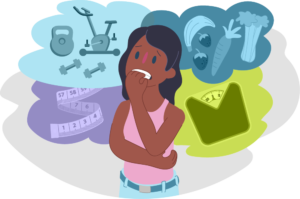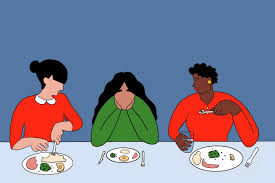If you have a loved one who is struggling with an eating disorder, it can be difficult to know how to help them. Eating disorders are serious mental illnesses that can cause a lot of pain and suffering for the person who has them and for their loved ones. In this comprehensive guide, we will discuss the different types of eating disorders, the signs that someone may be struggling, and the best ways to offer support. We hope that this guide will help you get your loved ones the help they need!
Contents
What Are Eating Disorders?

Eating disorders are serious mental illnesses that involve a distorted relationship with food. People with eating disorders may eat too much or too little, purge food through vomiting or laxative use, and/or exercise excessively. There are three main types of eating disorders:
One or multiple factors such as genetics, trauma, bullying, and low self-confidence, among others, can cause a person to suffer from an eating disorder. The impacts of these issues can have severe consequences on a person’s overall well-being.
How To Know Someone Is Suffering From An Eating Disorder?

When it comes to sensitive and triggering matters like eating disorders, it is important to take cautious steps to deal with things. It can be extremely impolite and inhumane to impose explicit and direct questions on a person, no matter how close you are to them. It can also make the other person feel embarrassed, angry, or humiliated.
If you are concerned about your loved one going through such an event, here are some underlying signs you can further take note of.
- They refrain from eating around people. Some typical excuses they’ll make can sound like statements such as ‘I am already full’ or ‘I don’t feel like eating’
- Taking frequent trips to the bathroom after meals can also be a sign of suspicion.
- An evident dip in their physical appearance can indicate the presence of an underlying struggle. These things may look something such as weight fluctuations, dark circles, low stamina, and dullness on the face.
- Observing a sudden and unprecedented increase in the person’s indulgence in exercising.
- They spend too much time obsessing over calories, fat content, or oiliness of the food.
- Suddenly wearing loose/baggy and body-covering clothing everywhere, even in the most inconvenient weather, to hide their body.
- Not eating what they are served; instead always want to cook for themselves.
Approaching someone to confront them about an eating disorder can be awkward, uncomfortable, and also disturbing. To make the other person feel safe and open, it is essential to create a friendly and safe environment. Make sure you have these conversations in private, away from others to further assure additional privacy.
How To Help Someone With An Eating Disorder?

Eating disorders are serious illnesses that need professional treatment. If you think your loved one has an eating disorder, it is important to be patient, understanding, as well as empathetic.
While seeking professional help is the most ideal treatment, one may avoid doing so due to several reasons. In such cases, try to be there for a person for emotional support.
- When approaching someone about these conversations, be mindful of the choice of words and the tone of voice you use. Do some preliminary research before stating your concern. Avoid direct and oblivious statements such as “you look very unhealthy”. Instead, you can gently ask “I have noticed you looking quite weak these days, are you doing okay?”.
- To assure maximum comfort and privacy, approach the person in private. Avoid making comments and questions in front of a lot of people since it may make a person feel awkward.
- Don’t assume anything. This can happen in statements like “but you look healthy to me”, “I know you are doing this to lose weight”, and “I already knew something is wrong with you”. Try to provide a more empathetic and patient ear.
- Ask questions. Instead of self-assigning the role of a savior, ask how the person would like to be supported. Supportive behavior can demonstrate itself in form of questions such as:
What can I do to help you feel better?
Do you want me to remind you to take your meals?
Would you like to eat with me?
Are you okay with having this conversation?
Do you want to share what you are feeling?
- One also needs to take into account the possibility of receiving resistance or denial. No matter how close you are with that person, they might not want to share certain things. Instead of taking it personally, respect the other person’s boundaries and let them know you are available whenever they feel like talking.
- A person suffering from an eating disorder often needs support instead of help. Instead of trying to help or save them, try to listen, support, and validate them.
Available Treatment For Eating Disorders
Once a person decides to get professional help, there are a few different types of treatment available. The first step is to visit a doctor or a mental health professional to conduct some tests and assess the situation. After that, they will most likely refer you to a specialist.
There are three main types of specialized treatment:
Psychotherapy
This is usually the first step in treatment. It involves meeting with a therapist to talk about your thoughts, feelings, and experiences. The therapist will help you understand the cause of your disorder, work on the feelings and emotions surrounded by it, and develop healthy coping mechanisms.
Medical treatment
This might be necessary if you are suffering from severe malnutrition or have other medical complications. You will work with a team of doctors to develop a plan that is right for you. Although there are no specific medications made to cater to the treatment of eating disorders, professionals may use Selective serotonin reuptake inhibitors (SSRI antidepressants) to treat the psychological symptoms. Nutritional supplements may also be prescribed to ensure the nutritional balance for physical health.
Nutritional counseling
This involves meeting with a dietitian to talk about your eating habits and developing a healthy relationship with food. They also monitor your nutritional balance and help to treat malnourishment.
Conclusion
If you have a loved one who you think may be struggling with an eating disorder, it is important to reach out and offer them support. Eating disorders are serious illnesses that can further have a profound impact on someone’s life. However, with the right help and support, people can recover from eating disorders and go on to lead healthy and happy lives. We hope that this guide has helped provide you with some information about how to further support your loved one. Thank you for reading!
A Word From Therapy Mantra
Your mental health — Your psychological, emotional, and social well-being — has an impact on every aspect of your life. Positive mental health essentially allows you to effectively deal with life’s everyday challenges.
At TherapyMantra, we have a team of therapists who provide affordable online therapy to assist you with issues such as depression, anxiety, stress, workplace Issues, addiction, relationship, OCD, LGBTQ, and PTSD. You can book a free therapy or download our free Android or iOS app.


